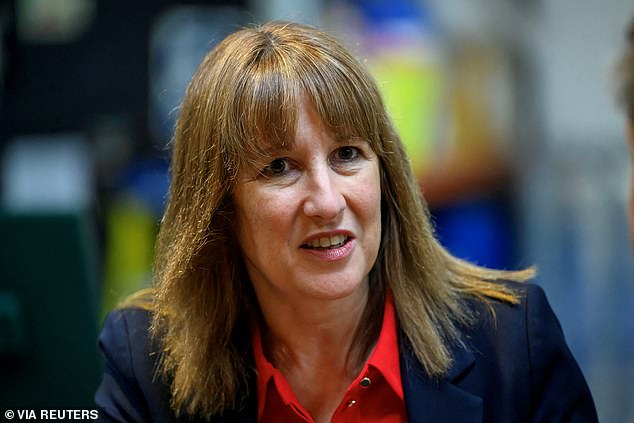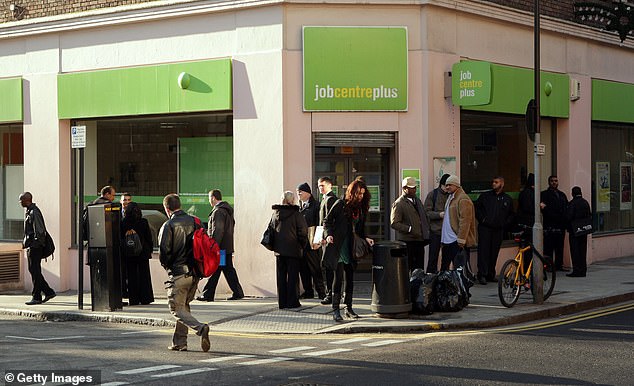When Rachel Reeves swept into Washington to attend her first meeting of the International Monetary Fund one year ago, she was in a bright, confident mood.
The Tories had been banished after 14 years in power, the economy was growing once again, inflation was in retreat and the Labour Chancellor had a plan to fix the public finances in her first Budget.
When Reeves returned to Washington yesterday, she was wearing the mask of bravado. There was even a spurious claim from the Labour spin machine that she was coming ‘to fly the flag for the UK as a beacon of stability and growth’.
Yet nothing could be further from the truth. Reeves’ early pledges to ‘fix the foundations’ of the British economy have subsided – and badly.
Last year’s £40 billion tax-raising Budget destroyed confidence and jobs, increased inflation and left a ‘black hole’ in our finances even greater than the one the Government claimed to have inherited from the Tories.
The Chancellor’s refrain that she would never take the risks the Conservatives took with the economy has proved hollow. The bond markets – where governments borrow the money they need to keep going day to day – are on red alert.
Labour seeks to convince us that it has made Britain a great place to invest. But our own leading-edge pharmaceutical companies, AstraZeneca and GlaxoSmithKline, are pouring tens of billions of pounds into America instead, thanks not least to the harmful levies placed by British governments on their products.
The latest economic projections from the IMF show a British economy that is now misfiring badly.

Rachel Reeves’ refrain that she would never take the risks the Conservatives took with the economy has proved hollow, writes Alex Brummer
Labour’s vainglorious goal to make the United Kingdom the fastest-growing among the Group of Seven rich Western states has not been achieved. Growth is stalling. Britain’s stuttering output will lag well behind that of Donald Trump’s America this year and in 2026 it will fall behind Canada, too.
All that mumbo-jumbo about helping working people is backfiring. The latest Labour market data from the Office for National Statistics show that Labour is not working. On the contrary, unemployment is rising.
The number of people on British payrolls has plummeted by 276,000 since Reeves’ output-crushing Budget last October. Ten thousand jobs have been lost in the course of the past three gruelling months alone.
The unemployment rate has shot up from 4.4 per cent when Labour took office to 4.9 per cent now.
It’s one of Labour’s favourite boasts that disposable income – the amount of cash ordinary Britons have to spend – has risen by £800 per household since it took over.
But this is hardly surprising given the way Labour gave in to union demands for inflation-busting pay increases, particularly in the public sector, without any call for productivity gains in return.
And now the chickens are coming home to roost. Inflation in the UK remains stubbornly high. Britain and Mexico are cited by the IMF as the two major economies which stand out for failing to get a grip on consumer prices.
We must also face the consequences of Labour’s actions since it came to power, most notably the Chancellor’s hike in employers’ National Insurance. This additional cost – and the inflation it helped create – means that hopes for a much-needed fall in interest rates are fading fast. That, in turn, is an enormous blow both to a stuttering housing market and to business investment in general – two key drivers of growth.

The unemployment rate has shot up from 4.4 per cent when Labour took office to 4.9 per cent
With Labour’s manifesto plans in chaos – and as Britain awaits further debilitating tax increases in next month’s Budget – the party’s brightest star, Health Secretary Wes Streeting, has had the temerity to blame Brexit for our economic woes.
Yet there has never been a better moment for Britain to be disconnected from a trading bloc which is not only moribund but faces insurmountable economic, financial and political challenges.
The Brussels bureaucracy is smothering much-needed efforts to reform Europe’s financial markets. The German economy, long viewed as Europe’s locomotive, is stalling badly. The political impossibility of making budget cuts has plunged France into the worst constitutional crisis of the Fifth Republic, a mess which makes Liz Truss’s short-lived sojourn in Downing Street look like a vicarage tea party.
Britain, despite all its problems, has been free to sign trade deals with some of the fastest-growing regions in the world.
When she was Business Secretary in the last government, Kemi Badenoch – now Tory leader – signed us up to the Comprehensive and Progressive Agreement for Trans-Pacific Partnership (CPTPP). This vast agreement covers five continents and 600 million people, stretching from Singapore to Peru.
Thanks to Brexit, Labour has concluded the first trade deal with the United States and has recently secured another with India. Such wide-ranging agreements would have been far harder to secure had we remained part of the EU.
By waiting until November 26 to hold her second Budget, Reeves is clearly hoping, like Charles Dickens’ Wilkins Micawber, that ‘something will turn up’. Yet the long run-up created by the Chancellor has been deeply destabilising.
Labour’s threat to impose a levy on pension pots – by limiting the size of the sums which can be withdrawn tax-free – has already seen money flow out of the investment market at record-breaking rates.
And the looming possibility that Reeves will impose a wealth tax is already encouraging rich entrepreneurs and bankers to move to jurisdictions with more lenient rules. Milan is proving popular.
Today, as she arrives in Washington, a Chancellor once so confident that she had all the answers has been found out.
She must know that another round of tax increases can only be a self-defeating exercise in shattering confidence and shredding jobs. It would add to the nation’s burgeoning welfare bill and trap us in a ‘doom loop’ – an ever-diminishing economy demanding ever-rising taxation to keep it alive.
There is something rotten at the heart of Labour’s budgetary incontinence. And when the next global earthquake strikes, we will be ill-equipped to withstand the forces of destruction.